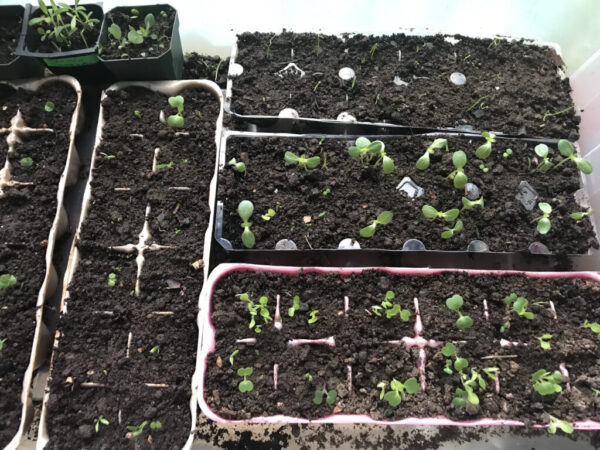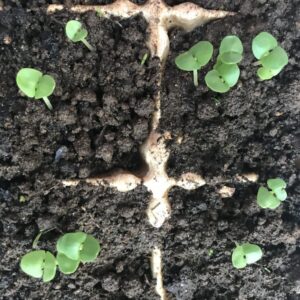- Like
- Digg
- Del
- Tumblr
- VKontakte
- Buffer
- Love This
- Odnoklassniki
- Meneame
- Blogger
- Amazon
- Yahoo Mail
- Gmail
- AOL
- Newsvine
- HackerNews
- Evernote
- MySpace
- Mail.ru
- Viadeo
- Line
- Comments
- Yummly
- SMS
- Viber
- Telegram
- Subscribe
- Skype
- Facebook Messenger
- Kakao
- LiveJournal
- Yammer
- Edgar
- Fintel
- Mix
- Instapaper
- Copy Link

A version of this column first ran in the Roane County (WV) Reporter and Times Record. Support local journalism! Subscribe to your local newspaper.
Why plant a garden? So many reasons! It’s good exercise, and gets you outside to absorb all that Vitamin D that keeps you healthy and cheerful. It’s a source of ultra-local, ultra-fresh food. It’s security, in case the pandemic or the economic aftershocks cause serious shortages later this year. It’s satisfying to watch your little seeds become little plants, and then big plants, and then plants yielding food. And it’s soothing, surrounding yourself with nature, greenery and sunshine and clouds, bugs, and bird calls.
If you’re ready to start a garden the first thing to do is make a plan. You have to find a place to garden, with at least six hours of sun a day, and decent soil. The WVU Soil Testing Laboratory conducts tests free for West Virginia residents and customers. Obtain instructions on how to test your soil amd download the form you need here. For more information, contact WVU Extension specialist Jeffrey Skousen at 304-293-2667.
Ideally the garden is right out back, but if you have no access to garden land where you live, perhaps you can start a community garden in your town. Sandy soil drains fast and thus requires more watering and more fertility, but is easier to work. Clay soil can’t be worked when it’s either too wet or too dry, but tends to be high in fertility and holds water longer. Both can be improved by adding lots of organic matter—compost, manure, peat moss, leaf mold.
How big a garden will you have time to tend? What do you want to grow? If this is your first garden, you might start with something easy, but lots of things are easier than you might think. Best bet is to grow what you and your family like to eat. However, if food security is your motive, you get some of your best bang for your square yard by growing potatoes—which also keep for months in cold moist conditions. You can buy seed potatoes at Farmers Friend and Garden Fresh, probably other places. Sweet potatoes are another good bet, and they will keep all winter on a dark shelf at room temperature. The slips are hard to find around here, but you can probably start some yourself from commercial sweet potatoes. Onions don’t take much room, nor do carrots. But I know you want to grow tomatoes—so do!
You can order seeds from catalogs, online or by mail, or you can buy them at Walmart or Southern States.
For the majority of us in this area, it’s nearly pointless to put in a garden without a fence, because of deer and maybe also groundhogs, rabbits, and dogs and cats (I have free range chickens I must screen out, too). There are various approaches to fencing, which you can buy at Southern States, Farmers Friend, and Hardman’s. You want something at least six feet high, but four feet with a wire a foot higher and then another a foot higher than that will suffice. If you invest in a really durable, solid fence, you’ll be glad you did if you’re still using that garden years from now.
Probably you will want to till up your garden, and work in some compost or manure, possibly with a little sand, and it may be more convenient to do this before putting up the fence. Now you can either plant in conventional rows, or create permanent beds. Permanent beds allow you to concentrate more of your garden on plant growing and less on walking space.
Beds need not have wooden sides; but if you rake up the loose topsoil into beds perhaps three or four feet wide, you will be depriving the walkways of fertility (less weeding!) while adding more good soil to the beds. The idea is, you never walk in these beds so you don’t compact the soil. I find it best to keep them twelve feet long—any longer and I’m liable to step in the beds to get across when I’m in a hurry. I realize this indicates a lack of character on my part, but there you have it—unless you are definitely more virtuous and patient than me, don’t make your beds too long.
Questions, objections and suggestions may be sent to wildfire@spectrumz.com
Read the next installments in this series: Part 2. Part 3.
——
Note: The WVU Extension Family Nutrition program runs an online gardening program called Grow This.
WV Public Radio news: Coronavirus Sprouts A Budding Interest In Gardening, Local Food In W.Va.









